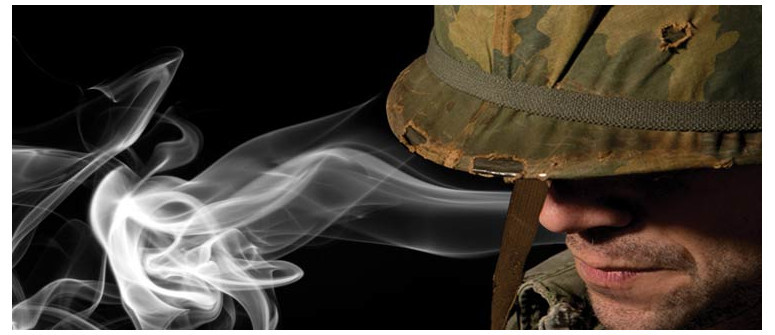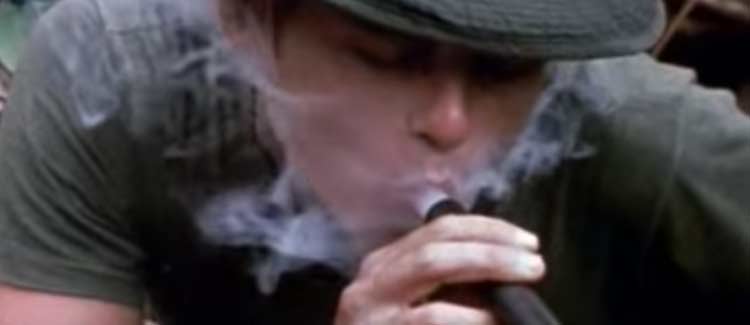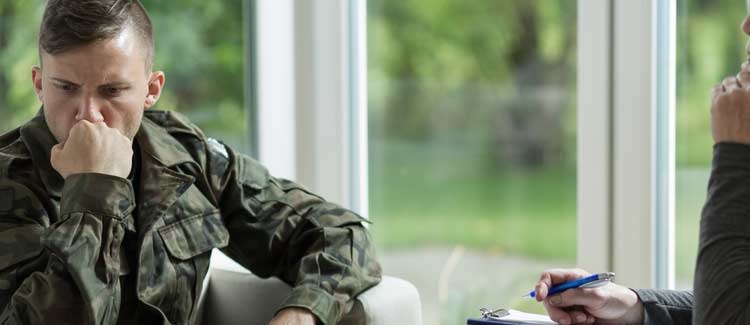Cannabis use during the vietnam war

We've all seen the pictures of soldiers smoking weed during the Vietnam War. So how did this really take place? And how did it influence te war?
If you've ever seen a movie or a TV show about the Vietnam war, you must have noticed the amounts of marijuana being used by the soldiers. Remember the movie “Platoon”, or the show “Tour of Duty”? Joints everywhere.
These depictions are not just to make the movies or series more cool, but are actually based on true situations in this case. As it turns out, cannabis was the second most commonly used substance by American troops during the Vietnam War, topped only by alcohol.
Surprisingly, most service members actually tried cannabis for the first time while deployed. In fact, only 8% had used it prior. And while only 29% of deployed troops reported smoking weed in 1967, that number jumped all the way to 34% by 1971.
Cannabis use in the military clearly peaked during that period, but it wasn’t exclusive to Southeast Asia.
United States GIs were actually smoking weed all over the world and not only in Vietnam. A popular article from 1971 claimed that “over 1,000 midshipmen at Annapolis Naval Academy used cannabis.”[1] During that same time, a survey from Germany determined that nearly half of the battalion soldiers that were stationed in Germany were smoking pot regularly.[2]
Not only did weed help soldiers deal with the many trials and tribulations of battle, but it actually had a pacifist effect on many troops. The Vietnam War was so much more than just a battle to stop the spread of communism. It was a time for change, rebellion, and freedom.
For some, the more they smoked, the more they began to oppose the war and everything the military stood for. Cannabis also helped troops connect with their comrades better, which made it easier for them to open up about difficult issues such as PTSD and politics regarding the war.
THE PACIFIST MOVEMENT HITS AMERICAN TROOPS
Weed wasn’t simply a tool for relaxation, it was an emblem of peace during extremely tumultuous times. After years of tragedy and, arguably, some influence from the weed, many servicemen decided they wanted nothing to do with the ongoing destruction.
A study of US servicemembers divulged something very unique to the Vietnam War, something that had never happened before in American history; by the end of the 1969, 37% of deployed troops disagreed with the war and some US policies.[3]
During that time, the US Department of Defense implemented a new program to eliminate cannabis use in the military completely, despite having looked the other way when it came pot—and even harder drugs like heroin and amphetamines—for many years.
On July 4, 1971, more than 1,000 US soldiers protested on Chu Lai Beach in central Vietnam, most of them smoking joints while doing so. “When they got there, they didn't know what to do, so they organized the biggest marijuana celebration in the history of the war,” states and excerpt from the book A People’s History of the Vietnam War. With billowing smoke and the sounds of Hendrix, Dylan, The Stones, and others, American soldiers made history in an unprecedented way.
HOW DID IT START?

Back in 1970, the US Military was becoming a less aggressive force in Vietnam and started gearing their efforts more towards maintaining defensive garrisons and training South Vietnamese soldiers. To combat a combination of PTSD, boredom, and low morale, many service members looked to nature for help, and what they found was an abundance of pot.
Even though cannabis consumption in any form was strictly prohibited by the military, that never deterred anyone from partaking. The exact numbers aren’t available, for obvious reasons, but records suggest that about half of deployed service members were smoking pot, and cannabis use was even more prevalent in Vietnam than in the US at the time.
When the Southern Vietnamese government got wind of the issue, they enacted a series of new legislation to make cannabis harder to obtain. This only backfired when heroin started making its way up the list of popular illicit drugs.
However, weed remained omnipresent as there was plenty of weed being grown in Vietnam, but since bongs and joint papers weren’t readily available in the wilderness of Vietnam, the GIs had to get creative for their high.
Vito, a 20-year-old squad leader from Philadelphia, displayed a 12-gauge shotgun that he and his men used to smoke bowls out of. Effective? Definitely. Safe? That’s debatable. After ejecting all the shells, Vito packs a bowl in the chamber and starts taking hits and passing it around the circle. If this sounds vaguely familiar to you, it might be because Oliver Stone recreated this scene in his 1986 movie Platoon.
DID CANNABIS HELP THE SOLDIERS?
Some sources claim that those in higher command not only chose to sweep the problem under the rug, but many even encouraged soldiers to smoke weed. They believed it could potentially help the war by keeping servicemen calm and focused, ready to spring into action while retaining their ability to think rationally and not become overwhelmed.
They also believed it alleviated social tensions within the group, and just boosted morale overall. People are always more productive when they’re content and not riddled with stress and anxiety. And, since it’s much safer (and easier to function on) than alcohol or opiates, leaders saw no reason to enforce prohibition.
CANNABIS AND TODAY'S MILITARY

Active duty military tend to refrain due to the strict penalties. However, many say it would be their substance of choice if the penalties weren’t so harsh.
Today, medicinal cannabis use is very common in the veteran community, as many come home with painful injuries or post-traumatic stress disorder (PTSD), both of which are conditions marijuana can assist with.
“When I got back from Iraq, I felt like an eggshell, and a basket case...And I was just doing all this self-destructive behavior that I could think of to not feel anything at all," states Marine Corps veteran Roberto Pickering, who was drinking himself to death until he started using cannabis.[4] Prior to becoming a medical marijuana patient, Pickering was prescribed a total of 14 different drugs, many carrying potentially dangerous side effects.
According to the Department of Veterans Affairs, an average of 20 veterans commit suicide every single day in the United States.[5] Out of the 29 states that have a medical marijuana program, 23 (and Washington D.C.) include PTSD on the list on qualifying conditions.
- ^ Newspapers, The Capital from Annapolis, Maryland Page 1, retrieved November-29-2018
Link - ^ Fighting in Vietnam: The Experiences of the U.S. Soldier, Soldiers issues in the Vietnam War and afterwards, retrieved November-29-2018
Link - ^ Anna Cienciala, Indochina and the Vietnam War. , retrieved November-29-2018
Link - ^ LA Weekly, This Cannabis Project Will Help Military Veterans Get Jobs in the Marijuana Industry, retrieved November-29-2018
Link - ^ Office of Public and Intergovernmental Affairs, VA Releases Veteran Suicide Statistics by State, retrieved November-29-2018
Link
.jpg)
.jpg)

.jpg)
